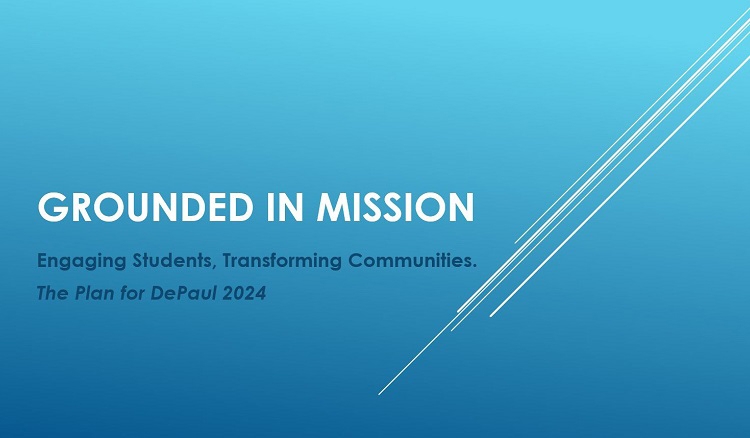 DePaul's new strategic plan was approved by the Board of Trustees at its spring meeting May 17. The plan will guide the university through 2024 and will kick off in fall 2018.
DePaul's new strategic plan was approved by the Board of Trustees at its spring meeting May 17. The plan will guide the university through 2024 and will kick off in fall 2018.
In a vote at its meeting this afternoon, May 17, the Board of Trustees approved the strategic plan that will guide DePaul through its next six years. The plan,
"Grounded in Mission: Engaging Students, Transforming Communities. The Plan for DePaul 2024," has six goals:
- Deepen our commitment to DePaul's Catholic, Vincentian, and urban mission,
- Ensure a welcoming, engaging, diverse, and inclusive campus environment,
- Excel in preparing all students for global citizenship and success,
- Expand access to a portfolio of high-quality, affordable academic programs that meet student, workforce, and societal needs,
- Elevate academic excellence and embrace a culture of creativity and discovery, and
- Employ bold approaches to ensure DePaul's continued fiscal strength for future generations.
"These goals are the right ones for DePaul at this particular moment in our history," said James T. Ryan, board chair. "Trustees look forward to working with faculty and staff to realize our next set of ambitions."
A. Gabriel Esteban, PhD, president, expressed his gratitude for the hundreds of faculty, staff and students who shared their ideas over the last year as the plan took shape. He also thanked the 19-member representative task force and the faculty, staff and students who served on the four planning teams that developed content and worked with feedback from all corners of the university to create a plan that represents the best thinking of our community.
"It was important that our strategic plan emerge from the university community's responses to the planning parameters established by the board at the beginning of the planning process," he noted. "This plan positions DePaul well, identifying areas for innovation to ensure an even stronger future as the university approaches its 125th year."
Dr. Esteban also cited the significant resources that were established in the most recent budget process that will be used in fiscal year 2019 and beyond to fund strategic initiatives. "In the 2018-19 budget, we allocated about $13 million to support academic innovation, revenue enhancement initiatives and strategic priorities identified in the plan," he confirmed, highlighting that the new funding will enable DePaul to capitalize on opportunities and respond to evolving student needs.
Jay Braatz, vice president for planning and presidential administration, talked about the ways the final plan responded to the feedback trustees, faculty staff and students had to the initial draft plan reviewed last March. As chair of the planning task force that developed the plan, she said, "We listened closely to input solicited at the town hall meetings and online and worked hard to incorporate the thoughtful feedback we heard."
The most substantive change made to the initial draft was in response to a board request to split the original first goal, which combined strategies for mission and diversity, to communicate the overarching and defining role of our mission, from which all other strategic priorities emanate.
Additional ways that this plan responded to thoughts voiced by members of the DePaul community included:
- a statement about the provision of student health and wellness services, given the increasing physical and mental health challenges students face,
- support for faculty to experiment with more affordable course materials in response to student concerns with rising textbook costs,
- a section acknowledging work to be done in establishing new and enhancing existing graduate programs, and supporting those students' success,
- recognition of the importance of a liberal arts education as well as acknowledgement of information literacy as a core competency among other competencies identified in the document,
- a call for thought leadership on pressing issues of social and environmental justice, including work to eradicate street homelessness globally,
- support for the career development of our staff,
- and acknowledgement of the important roles all of our faculty, both full-time and part-time, play in student learning and success.
Finally, a vision statement was crafted to imagine what DePaul could achieve as a result for plan implementation.
The statement envisions DePaul as "unequaled among urban universities in the United States in ensuring the success of a diverse community of learners." It puts students at the center of our strategic priorities, stating that a DePaul education will prepare students to thrive and become effective agents of change in the world. It also anticipates the university will deepen its mission of access and serving students' lifelong learning needs with innovative, affordable, transformative programs, grounded in our Catholic and Vincentian values.